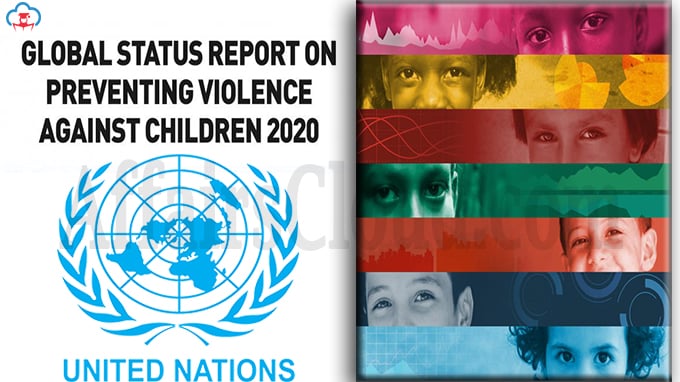 In accordance with the “Global Status Report on Preventing Violence Against Children 2020”, a first of its kind report by United Nations (UN), upto 1 billion children are affected by physical, sexual or psychological violence, with long-lasting and costly emotional, social and economic consequences due to the inability of the countries to protect them by following the established strategies.
In accordance with the “Global Status Report on Preventing Violence Against Children 2020”, a first of its kind report by United Nations (UN), upto 1 billion children are affected by physical, sexual or psychological violence, with long-lasting and costly emotional, social and economic consequences due to the inability of the countries to protect them by following the established strategies.
- This COVID-19 lockdowns have made the situation worsen which have left far too many youngsters stuck with their abusers.
- The report has been launched by the World Health Organisation (WHO), the UNICEF (United Nations Children’s Fund), the United Nations Educational, Scientific and Cultural Organization (UNESCO), the UN Special Representative of the Secretary-General on Violence against Children and the End Violence Against Children.
- It charted progress in 155 countries against the “INSPIRE” framework, a set of seven strategies for preventing and responding to violence against children.
Global status:
-It is estimated that one out of two children aged 2–17 years suffer some form of violence each year.
-Close to 300 million children aged 2–4 years regularly experience violent discipline by their caregivers.
-A third of students aged 11–15 years worldwide have been bullied by their peers in the past month, and 120 million girls are estimated to have suffered some form of forced sexual contact before the age of 20 years.
-Emotional violence affects one in three children.
-Estimated 40,150 children worldwide were victims of homicide in the year 2017. The global homicide rate for 0–17 year olds was 1.7 per 100 000 population, and the rate for boys of 2.4 per 100 000 was over twice that in girls (1.1 per 100 000 population)
Efforts by Countries:
89% of countries allocate responsibility to multiple sectors for addressing violence against children, with the education, health, justice and social sectors; and 80% of countries have at least one national action plan to prevent violence against children. Towards INSPIRE, 56% of countries provide some national support for implementing the INSPIRE strategies.
- The evidence behind the INSPIRE approaches shows that 20% to 50% decreases in prevalence have been achieved by well-designed programmes.
- Between 32% and 37% of the countries considered that victims of violence could access support services, while 26% of the countries provided programmes on parent and caregiver support; 21% of the countries had programmes to change harmful norms; and 15% of the countries had modifications to provide safe physical environments for children
What is INSPIRE?
Launched in 2016, INSPIRE is a set of seven evidence-based strategies for countries and communities working to eliminate violence against children. INSPIRE is an acronym, with each letter representing a strategy:
- I for the implementation and enforcement of laws;
- N for norms and values;
- S for safe environments;
- P for parent and
- caregiver support;
- I for income and economic strengthening;
- R for response and support
- services; and
- E for education and life skills.
About UNESCO:
Headquarter– Paris, France
Director-General– Audrey Azoulay
Members– 193 Members and 11 Associate Members
About UNICEF:
Headquarter– New York, United States (US)
Executive Director– Henrietta Holsman Fore
About WHO:
Headquarters– Geneva, Switzerland
Director general– Tedros Adhanom Ghebreyesus
Chief Scientist– Soumya Swaminathan
About End Violence Against Children:
Executive Director– Howard Taylor
Headquarter– New York, US
About UN Special Representative of the Secretary-General on Violence against Children:
Special Representative– Dr. Najat Maalla M’jid of Morocco




